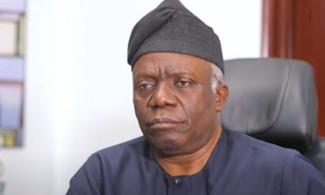Treat Trump’s Warning as Wake-Up Call for Nigeria, Falana Urges Tinubu

Prominent human rights lawyer, Femi Falana, SAN, has called on President Bola Ahmed Tinubu and his administration to treat former U.S. President Donald Trump’s warning about Nigeria as a wake-up call, urging swift action to address the country’s deepening security and governance challenges.
Falana, speaking on a national television programme, criticised Trump’s claim of a “Christian genocide” in Nigeria, describing it as factually inaccurate and politically motivated.
He emphasised that the ongoing violence in Nigeria—ranging from terrorist attacks to kidnappings and banditry—is driven by criminality and insecurity, rather than religious motivations.
“For us as a people and for the government of Nigeria, we must take Mr. Trump’s warning as a wake-up call,” Falana stated.
He challenged the federal government to focus on internal reforms rather than reacting defensively to external pressure. According to Falana, issues such as the failure to implement nationwide grazing bans and the lack of functional ranches in line with state agreements have exacerbated insecurity, particularly in rural areas.
Falana also condemned the ineffectiveness of security agencies and legal institutions in prosecuting cases of terrorism and criminal violence. He highlighted that, while suspects are often arrested and paraded by security operatives, state Attorneys-General rarely pursue successful prosecutions, allowing impunity to thrive.
While criticizing Trump’s use of religious rhetoric, Falana maintained that the federal government must demonstrate leadership by taking decisive measures to protect citizens and restore public confidence.
“The government must act swiftly to safeguard lives and prevent Nigeria from being embarrassed on the international stage,” he added.
Security analysts say Falana’s remarks underscore the dual challenge facing the Tinubu administration: managing international scrutiny while simultaneously tackling domestic insecurity. Trump’s warning, which suggested that U.S. military intervention could be considered if killings of Christians continued, has drawn condemnation from Nigerian officials, who insist that the country’s constitution protects citizens of all faiths equally.
Falana’s intervention places the spotlight on governance, accountability, and effective security management as critical priorities. He urged the government to strengthen prosecution of criminals, enforce policies to reduce farmer-herder conflicts, and ensure that security operations are impartial and effective.
The lawyer’s message serves as both a rebuke and a reminder: regardless of the validity of external threats, the onus remains on Nigerian authorities to safeguard lives, enforce the law, and restore peace across the nation.









